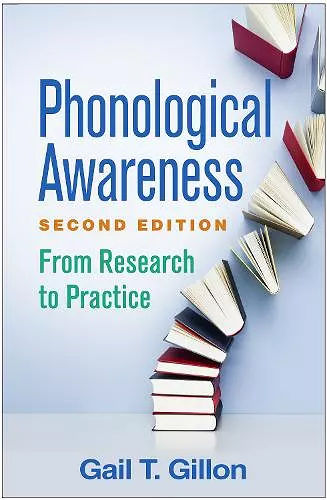Phonological Awareness, Second Edition
From Research to Practice
Format:Paperback
Publisher:Guilford Publications
Published:17th Jan '18
Should be back in stock very soon
This paperback is available in another edition too:
- Hardback£51.99(9781462532896)

Translating cutting-edge research into practical recommendations for assessment and instruction, this book has helped thousands of readers understand the key role of phonological awareness in the development of reading, writing, and spelling. It clearly shows how children's knowledge about the sound structure of spoken language contributes to literacy acquisition. Evidence-based strategies are described for enhancing all learners' phonological awareness and effectively supporting those who are struggling (ages 3–17). The book discusses ways to tailor instruction and intervention for a broad range of students, including English language learners (ELLs) and those with reading or language disorders.
New to This Edition:
*Incorporates over a decade of important advances in research, assessment, and instruction.
*Chapter on ELLs, plus additional insights on ELLs woven throughout the book, including new case studies.
*Chapter on spelling development.
*Significantly revised coverage of children with complex communication needs.
"Dr. Gillon’s contributions are amazing! If only all reading/literacy instructors, university professors of education, school administrators, and speech–language pathologists were to read, digest, and apply the insights in this book, I am certain that 'at-risk' children would become significantly better readers, and that the literacy skills of all children would be enhanced as well. This volume is loaded with evidence-based information, but it also is extremely readable."--Barbara Williams Hodson, PhD, Professor Emerita of Communication Sciences and Disorders, Wichita State University
"Gillon addresses theoretical and practical aspects of the important role of phonological awareness in becoming literate, the basic right of every individual. The second edition presents up-to-date research on the development of phonological awareness as well as the practicalities of helping children learn to read and spell. This excellent volume fills a need for literacy researchers and practitioners and will be an exceptional resource for literacy courses at the undergraduate and graduate levels. I will definitely use it in my classes."--R. Malatesha Joshi, PhD, Department of Teaching, Learning, and Culture, Texas A&M University; Fellow, American Educational Research Association
?"What makes this book stand out is its attention to the importance of phonological awareness and other linguistic awareness skills to both reading and spelling. Strong content on assessment and intervention makes this a valuable resource for educators and specialists, such as speech–language pathologists, alike. It will be a welcome addition to courses on language development and/or disorders."--Kenn Apel, PhD, CCC-SLP, Department of Communication Sciences and Disorders, University of South Carolina
"This excellent second edition provides clear and comprehensive answers to essential questions: How does phonological awareness develop and transfer across languages? Why is it so crucial in learning to read and spell? How can it be assessed in children of differing ages and cognitive and linguistic abilities? The volume reviews evidence-based instructional strategies and programs for supporting the development of phonological awareness in children with a wide range of literacy learning needs. It offers highly useful information for classroom teachers, intervention specialists, speech–language pathologists, educational psychologists, teacher educators, and educational policymakers."--William E. Tunmer, PhD, Distinguished Professor of Educational Psychology, Massey University, New Zealand -
"Dr. Gillon’s contributions are amazing! If only all reading/literacy instructors, university professors of education, school administrators, and speech–language pathologists were to read, digest, and apply the insights in this book, I am certain that 'at-risk' children would become significantly better readers, and that the literacy skills of all children would be enhanced as well. This volume is loaded with evidence-based information, but it also is extremely readable."--Barbara Williams Hodson, PhD, Professor Emerita of Communication Sciences and Disorders, Wichita State University
"Gillon addresses theoretical and practical aspects of the important role of phonological awareness in becoming literate, the basic right of every individual. The second edition presents up-to-date research on the development of phonological awareness as well as the practicalities of helping children learn to read and spell. This excellent volume fills a need for literacy researchers and practitioners and will be an exceptional resource for literacy courses at the undergraduate and graduate levels. I will definitely use it in my classes."--R. Malatesha Joshi, PhD, Department of Teaching, Learning, and Culture, Texas A&M University; Fellow, American Educational Research Association
​"What makes this book stand out is its attention to the importance of phonological awareness and other linguistic awareness skills to both reading and spelling. Strong content on assessment and intervention makes this a valuable resource for educators and specialists, such as speech–language pathologists, alike. It will be a welcome addition to courses on language development and/or disorders."--Kenn Apel, PhD, CCC-SLP, Department of Communication Sciences and Disorders, University of South Carolina
"This excellent second edition provides clear and comprehensive answers to essential questions: How does phonological awareness develop and transfer across languages? Why is it so crucial in learning to read and spell? How can it be assessed in children of differing ages and cognitive and linguistic abilities? The volume reviews evidence-based instructional strategies and programs for supporting the development of phonological awareness in children with a wide range of literacy learning needs. It offers highly useful information for classroom teachers, intervention specialists, speech–language pathologists, educational psychologists, teacher educators, and educational policymakers."--William E. Tunmer, PhD, Distinguished Professor of Educational Psychology, Massey University, New Zealand -
ISBN: 9781462532889
Dimensions: unknown
Weight: 404g
272 pages
2nd edition